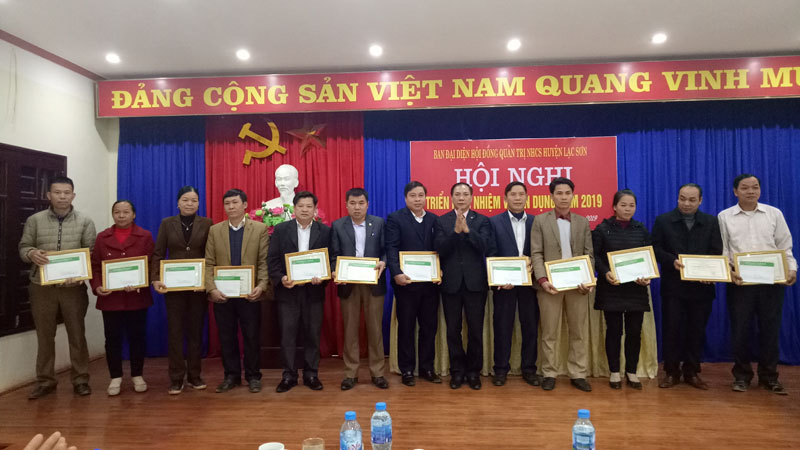
(HBO) – The Representative Committee of the Board of Directors of the Vietnam Bank of Social Policy (VBSP) branch in Lac Son district held a conference to review credit activities in 2018 and launch tasks for 2019.
In 2018, outstanding loans under the branch’s 15
credit programmes in the district totalled 388.13 billion VND (16.73 million
USD), up 25.43 billion VND from the start of the year.

Leaders
of the VBSP provincial chapter present reward to 12 communes posting no overdue
debts in 2018.
The bank had a total of 18,115 customers in
the district, who were members of 492 saving and borrowing groups. On average,
each commune or town has 17 operating groups, with an average membership of 37 and
average outstanding loans worth 787 million VND each.
Twelve out of 29 communes and towns in Lac Son,
or 41.38 percent, recorded no overdue debts. As many as 402 groups received good
ratings, while 88 others gained fair ratings and two groups ranked average,
with no underperforming groups.
Social policy credit has provided financial
resources for more than 18,000 households living below or just above the
poverty line along with beneficiaries of the State’s preferential policy to
develop household production or business, thereby creating new jobs and
ensuring social welfare.
At the event, the VBSP branch in Lac Son
district outlined nine key tasks for 2019.
On the occasion, the bank’s provincial branch presented
rewards to 12 communes recording no overdue debts in 2018. Meanwhile, the
People’s Committee of the district handed over rewards to 11 collectives and 13
individuals with outstanding performance in social policy credit in 2018./.
The Standing Board of the Hoa Binh provincial Party Committee has agreed in principle on a proposal by the Standing Board of the Party Committee of Hoa Binh city to gather feedback on the city’s 1:2000 zoning plan, which forms part of its broader urban development strategy.
Hoa Binh province has made notable progress in public administration reform and digital government development, with the satisfaction index among citizens and businesses reaching over 84%, according to recent government evaluations.
Thanks to great efforts by local authorities in recent times, the governance and public administration performance of Mai Chau district has been significantly improved.
In the afternoon of June 6, the Party Committee, the People's Council, the People's Committee and the Fatherland Front of Lac Son district solemnly held a meeting to celebrate the 139th anniversary of the district's founding (1886–2025) and the 79th anniversary of the establishment of the district's Party Committee (1946–2025). There was the attendance of Mr. Bui Van Thang, the Vice Chairman of the Provincial People's Council; Mr. Quach Tat Liem, the Vice Chairman of the Provincial People's Committee; Ms. Dang Bich Ngoc, the Deputy Head of the National Assembly Delegation of the province; as well as the former leaders of the province and district through various periods, who are the natives of the district.
Implementing the Politburo’s Resolution No. 57-NQ/TW on breakthroughs in science – technology, innovation, and digital transformation is a golden opportunity for the northern mountainous province of Hoa Binh to renew growth model, improve competitive edge and shorten digital gap.
Resolution 57-NQ/TW, issued by the Politburo on December 22, 2024, identifies sci-tech, innovation, and digital transformation as strategic breakthroughs to build a developed and prosperous nation. In Hoa Binh province, this spirit is not just a slogan, it’s being put into action through concrete initiatives that form a "new development triangle”: digital citizenship, digital economy, and digital administration.



